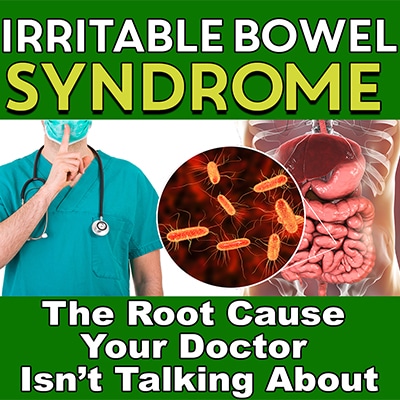Irritable Bowel Syndrome: The Root Cause Your Doctor Isn’t Talking About
With a quick search in google, the cause of irritable bowel syndrome throughout the web is deemed to be “unknown.”
Over 20% of the United States population struggles with the uncomfortable and debilitating symptoms of irritable bowel syndrome, yet most people are unsure of the root cause.
With the continued research into your gut microbiome, we are beginning to uncover the truth of this “trash can” diagnosis.
Being diagnosed with irritable bowel syndrome can truly feel like a sucker punch to your gut.
It may seem that your road to recovery is daunting, and since doctors are unable to pinpoint the exact cause of irritable bowel syndrome you may feel helpless.
Some doctors might tell you, “It’s all in your head.” Leaving you with even more doubt and a useless prescription for depression or anxiety.
They may blame the cause of irritable bowel syndrome on mental health, but it’s not all in your head.
Bacteria in your gut is beneficial for your overall health, if you have the right bacteria growing in the right place.
If certain bacteria ends up in the wrong place such as your small intestine it can cause major digestive issues such as the ones you experience with irritable bowel syndrome.
Your irritable bowel syndrome (IBS) symptoms may be caused by small intestinal bacterial overgrowth (SIBO) – here inlies the IBS and SIBO connection.
What Causes Bacterial Overgrowth in the Intestines?
Your gut bacteria work wonders on your body when it’s healthy.
It doesn’t affect just your gut. It also helps to prevent other health issues such as obesity, diabetes, and liver disease.
But when gut bacteria grows where it’s not supposed to such as your small intestine, it can lead to a dysfunction in your digestive system.
Gut dysbiosis, an imbalance of gut bacteria, can occur from certain triggers such as:
- Stressful situations
- Antibiotics
- Infections
- Abdominal surgery
- Diabetes
- Neurological disorders
- Diverticulum
Really any environmental factor or disease which affects the motility of your intestines can cause small intestinal bacterial overgrowth.
This is because your body has a natural way of clearing out or flushing your small intestine of bacteria through its migrating motor complex and peristalsis.
Most of your gut bacteria live in your large intestine where they’re able to work their magic.
But when your small intestine can’t flush these bacteria to your large intestine effectively due to certain factors, gut bacteria become stagnant in the small intestine.
These bacteria feed on the foods you eat, specifically starches.
As the starches are broken down, the byproducts of these bacteria include gases such as hydrogen, methane and hydrogen sulfide which are the main culprits causing your bloating, abdominal pain, diarrhea, or constipation.
Since your intestinal motility has slowed, it has trouble pushing out this excess gas trapped in your small intestine.
This trapped gas can wreak havoc on your digestive system which can cause uncomfortable irritable bowel syndrome symptoms.
The Vicious Cycle
There’s now a vicious cycle forming in your gut.
The bacteria trapped in your small bowel releases hydrogen gas as a metabolic byproduct from the starches you eat.
Another microbe called archaea, which was initially classified as archaebacteria, can creep into your small intestine and feed off this excess hydrogen gas.
These methanogen archaea release methane gas which has been shown to slow intestinal transit time and decrease intestinal motility – causing bloating and IBS symptoms.
These archaebacteria are hard to eradicate and modern antibiotic therapy has not proven successful in those with predominant constipation IBS.
IBS and SIBO Connection
- In one study, up to 78% of patients with irritable bowel syndrome tested positive for small intestinal bacterial overgrowth. Although small intestinal bacterial overgrowth is not the only cause of irritable bowel syndrome, it has a high prevalence in those with IBS.
When bacteria proliferate in the small intestine, a place where it’s usually sterile from bacteria, it can cause a domino effect of irritable bowel syndrome symptoms and other diseases.
Small intestinal bacterial overgrowth and irritable bowel syndrome can also lead to malabsorption of nutrients in the body and even trigger inflammation in your gut.
This low-grade inflammation from SIBO has been shown to increase intestinal permeability or “leaky gut.”
Small Intestinal Bacterial Overgrowth Diet
To naturally get rid of small intestinal bacterial overgrowth, changing your diet is a major factor.
You are what you eat and mainly you are what your bacteria eat.
Since the bacteria that are overgrowing in your small intestine thrive off of sugar and refined carbohydrates it’s a matter of eliminating these foods off the bat.
Try following a ketogenic diet or low FODMAP diet for the first month when trying to eliminate SIBO.
These diets eliminate processed foods and reduce your intake of refined carbohydrates, which can help starve the overgrowth of bacteria in your small bowel.
Kick Out Unwanted Guests in Your Gut
Conventional medicine for irritable bowel syndrome targets your colon – laxatives and antidiarrheal. This only treats your symptoms, not the root cause of irritable bowel syndrome.
By treating the actual cause of irritable bowel syndrome you can eliminate the bacteria wreaking havoc in your gut and causing your IBS symptoms.
You can treat small intestinal bacterial overgrowth naturally by starving off these unwanted guests in your gut through your diet.
But eliminating the resilient archaea can be a challenge since these microbes are very stubborn.
Atrantil works by eliminating these stubborn unwanted bacteria and archaea in your small intestine and getting them to go back into the colon where they belong.
Atrantil can help break the vicious cycle happening in your gut with it’s strong and effective polyphenol ingredients.


Atrantil has worked well for me. Initially I was afraid to take the recommended dose of 2 capsules 3 times a day and I didn’t get much relief. Since I have been taking it as directed for several weeks I have seem a major improvement in my symptoms. I have had major abdominal surgery resulting in adhesions. I will taking this product as it has worked along with a low carb diet that eliminated sugar, grains and dairy.
Hi Gloria,
Thank you for sharing your experience with us. We love hearing from our customers and are so happy that you are feeling better with Atrantil! Please let us know if we can ever be of assistance.
Thank you and best wishes,
Team Atrantil
Searched for a year to find some relief from an intestinal issue which began almost out of nowhere. Pretty sure I had/have leaky gut. Use acupuncture which helped and pureeing my food for three months. Basically eating only five foods for six months until I could get it under control. Still wasn’t feeling great but much better. Had cramping pretty regularly and was always afraid to be out somewhere. Found Atrantil and it’s been helping an incredible amount. I have only been taking the 2 a day dose but am going to increase it for 30 days to see if it makes me completely recover from this. I’ve told my friends who are suffering intestinal issues about Atrantil too – one friend is the one who got me started looking into SIBO because she has been battling that for three years on and off. My other friend is experiencing major pain and problems so I told her about it. Her grandson was just diagnosed with Autism a and I sent her your Autism and the Gut article. Wish it wasn’t so expensive – that is my only complaint – to take the 9 a day means it only lasts 10 days. That’s why I wasn’t taking as much. Spent a ton on supplements which didn’t help. This definitely helped. Thanks for the website, the info, and the product!
Hi Nancy,
Thank you for your feedback. We are so happy you are feeling better with Atrantil! We encourage you to look into our subscription program where you can receive 15% off each order plus free shipping. We hope this helps, please let us know if we can be of further assistance.
Thank you and best wishes,
Team Atrantil
If Atrantil works so good, perhaps there should be some extensive directions along with bottles. I bought 2 bottles and felt absolutely nothing while taking them daily for over 6 weeks. My condition embarrasses me and I cant find one thing that helps me.Thank you for the book.
Does Atrantil help resolve Histamine intolerance?
Hi Maryanna,
Great question!
Histamine intolerance can develop from inflammation caused by bacterial overgrowth. Some of the polyphenols in Atrantil do have properties that stabilize mast cells and therefore, indirectly yes, Atrantil does help with histamine intolerance. However, Atrantil is not a direct histamine blocker. We hope this helps to clarify.
Please let us know if we can be of further assistance.
Thank you and best wishes,
Team Atrantil